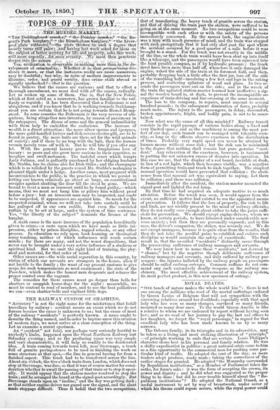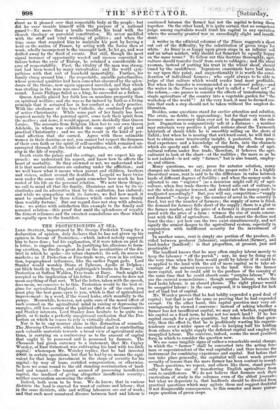ROYAL DEATHS.
" OKB touch of nature makes the whole world kin " : there is not one among the millions who read of the mortal sufferings endured by Queen Louise of Belgium that will not sympathise with the sorrowing relatives around her deathbed; especially with that aged lady who has seen so many changes, survaved so many friends, mourned so many dear ones. To the world-Queen Amehe is like a relative to whom we are endeared by report without having seen her; • and as we read of her journey to pay the last sad offices to her daughter, we forreo t the "royal personage," in regard for that excellent lady who has been made known to us by so many SOTTOws. The Orleans family, in its triumphs and in its adversities, may be taken as a living and most striking illustration of "
-
—of principle working to ends that are certain. Louis Philippe's character shone best in his personal and family relation. He was a shifty expedientist in politics: a great national crisis came to him as a fine opportunity to the commercial man for pushing some par- ticular kind of traffic. He adopted the cant of the day, as mere traders adopt produce, ready made • taking the correctness of the earlier stages for granted. He adopted "the Monarchy surrounded by Republican institutions," as a Member of Parliament takes the oaths, for form's sake: it was the form of accepting the crown, its power and dignity; and he did what was suggested as the proper thing to be done: but did he ever trouble himself about the "Re- publican institutions"? He adopted the National Guard, as a useful instrument to act by way of breastwork, under cover of which his throne could repose secure, while the royal power could shoot as it pleased over that respectable body at the people : but did he ever trouble himself with the purpose of a national guard P—No more than a beadle troubles -his head with the church theology or parochial constitution. He never meddled with the stuff and vital working of kolitics ; and when, the time came that required him to maintain his post by having a hold on The nation of France, by acting with the forces then at work, wholly incompetent to the unsought task, he let go, and was drifted away by the flood of events. But still, though the most signal instance of opportunity wasted and success converted to failure before the eyes of Europe, he retained a considerable de- gree of 'respectability. First, the vitality of the man was strong, and had been tested by many vicissitudes ; and the world sym- pathises with that sort of leasehold immortality. Further, his family clung around him : the respectable, amiable paterfamilias, whose personal qualities had been somewhat obscured by the splen- dours of the throne, now again appeared unveiled, and that which was sterling in the man was once more known—again tried, again sound. Louis Philippe failed as a king, he succeeded as a father. Queen Amelie placed her faith less on mundane prosperity than on spiritual welfare ; and she was so far imbued by faith as a living principle that it actuated her in her conduct as a daily practice. With the obedience of the true Catholic, she combined the spirit of active Christianity. While some part of her family has been inspired mainly by the paternal spirit, some took their spirit from the mother • and none, it would appear, more decidedly than Queen Louise. The accounts from Belgium liken her to our own Queen Adelaide' in whom was exhibited the same spirit of piety and practicalChristianity ; and we see the result in the kind of per- sonal affection that she earned. Agree with these estimable Women in their doctrine or not, you cannot but respect the firmness of their own faith or the spirit of self-sacrifice which remainea un- corrupted through all the trials of temptations, so rife, so devitali- zing in the life of royalty. Death visits the palace and the cottage and we expect his a. preach: we understand his aspect, and know how he affects the heart of mortality. Be they crowned or not, we understand what it is that mortal creatures are enduring under the affliction ; and we well know what it means when parent and children, brothers and sisters' collect around the deathbed. Leopold we have twice seen under the same trial, and again remember how much he has rested of his life on the personal relation. We note these things ; we call to mind all that the family, illustrious not less by its vi- cissitudes and its adversities than by its exaltation, has endured; and while we sympathise -with its sorrows' we feel how much it must be sustained. by those reliances which endure more firmly than worldly fortune. But our regard does not stop with admira- tion; we notice with satisfaction this example to the family and personal relation—this proof that amid the splendours of royalty the firmest reliances and the sweetest consolations are those which are equally open to the humblest.



























 Previous page
Previous page